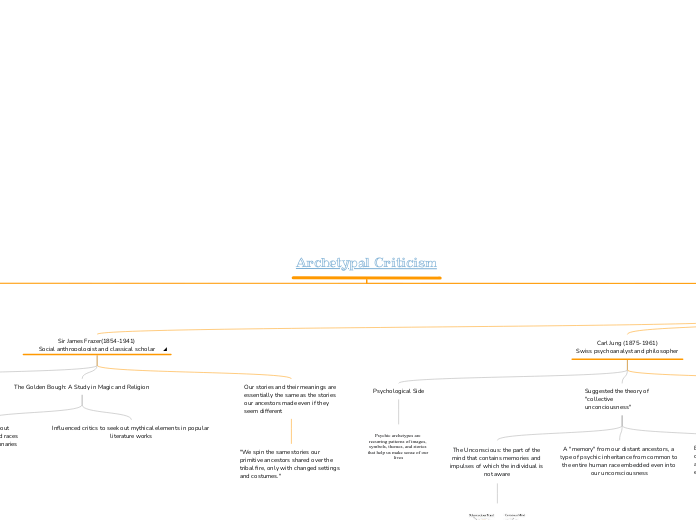Archetypal Criticism
Overview
Definition
Archetypal Criticism is a type of analytical theory that illuminates text based on recurring myths and archetypes in the literary piece.
"The conviction of archetypal literary critics is that there is a realm of human experience expressed in many myths and fantasy stories that goes deeper than any rational or intellectual thinking." (Gillespie 1)
Examples
"... the ancient Greeks saw the sun’s progress across the sky as the daily ride across the sky of the god Helios in his blindingly bright chariot." (Gillespie 3)
In the example above, although it is observable that the sun rises everyday, the main concept to grasp is that it expresses our unconscious sense of the eternal story.
William Shakespeare's Romeo & Juliet is an example of a character archetype (star-gazed lovers).
“A pair of star-crossed lovers take their life, Whose misadventured piteous overthrows, Doth with their death bury their parents' strife.” (Shakespeare 7)
Types of Archetypes
Character Archetypes
The Devil Figure - Tempts the hero
The Star-Crossed Lovers - The lovers who usually meet tragedy
Situational Archetypes
Battle of Good and Evil
Nature vs. Mechanistic World
Setting Archetypes
The Garden - Symbolizes love and fertility
The Island - Symbolizes isolation
Symbolic Archetypes
Fire - Knowledge, rebirth
Ice - Death, ignorance
Benefits
Reinforces our knowledge of mythology.
A study of archetypal criticism can provide wisdom and knowledge from past history. Even at a basic level of study will prove beneficial.
"... which scholars such as Joseph Campbell believe is foundational information for any educated person, and gets us thinking about all the essential experiences and wishes we share with other people in other times and places." (Gillespie 4)
Studying archetypal criticism gives perspective to our lives.
When we relate read these types of stories we learn to relate ourselves to the people in these stories. Watching these Hero's win their battles reminds us that we too, will win our battles.
Can be helpful in the endless human quest to find out who we are.
We gain a better understanding of our world, our literature, and our own beliefs by studying mythology.
"In other words, studying the mythic roots of literature can be helpful in the endless human quest to find out who we are.Thus, archetypes, according to their fans, not only take us back to the beginning of humankind’s oldest rituals and beliefs, thus connecting us to others, but also take us deeper into an understanding of our own individual psyches." (Gillespie 5)
Limitations and Critiques
History
The Golden Bough: A Study in Magic and Religion
He collected data about different cultures and races through other missionaries
Influenced critics to seek out mythical elements in popular literature works
Our stories and their meanings are essentially the same as the stories our ancestors made even if they seem different
"We spin the same stories our primitive ancestors shared over the tribal fire, only with changed settings and costumes."
Psychological Side
Suggested the theory of "collective unconciousness"
Believed that human beings are connected to each other and their ancestors through a shared set of experiences.
Northrop Fry (1912-1991)
Declared that literature is a kind of displaced mythology, and all contemporary literary works root back to the same patterns found in old myths, legends, and folktales
Fry believed that we can often identify archetypal geographies, character types, story aspects, and themes that give literature its structural unity.
Archetypal criticism allows you to look beyond the setting of the story and helps you identify it's orignality and the myths associated with it
Believed that the coordinating principle was its base in primitive story formulas
tragedy associated with the fall
bitter irony and satire associated with bleak winter
comedy associated with spring
romance associated with a high point in the summer
